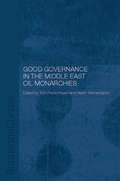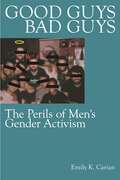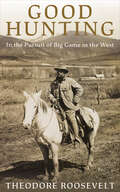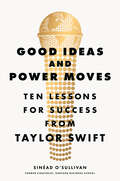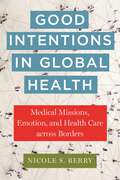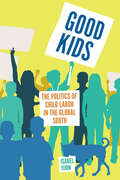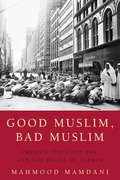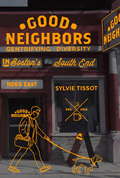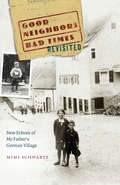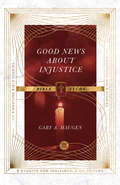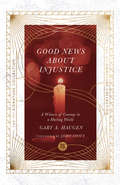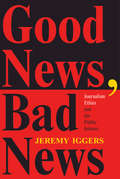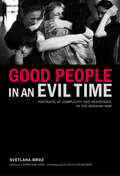- Table View
- List View
Good Governance in the Middle East Oil Monarchies (Durham Modern Middle East and Islamic World Series)
by Tom Pierre Najem Martin HetheringtonThe concept of 'good governance' is of increasing importance, and is used by international organizations to ensure reasonable conformity to high standards in states which participate in the global trading regime and other international activities. This book examines the concept of good governance and how it is applied in the states of the Gulf Co-operation Council. These states are particularly important because of their strategic location and massive oil wealth. Moreover, as monarchies, in most cases without powerful democratic representative bodies, and as Islamic countries, with a different outlook from countries of the West, Western standards of good governance may need to be modified in order for them to be implemented effectively.
Good Grief: Healing Through the Shadow of Loss
by Deborah Morris CoryellA compassionate guide to the experience of loss as an essential growth process • Explores the nature of loss as a profound mystery shared by all human beings • Offers sensitive and practical advice for experiencing grief and preparing for the healing journey that follows We grieve only for that which we have loved, and the transient nature of life makes love and loss intimate companions. In Good Grief professional grief educator Deborah Morris Coryell describes grief as the experience of not having anywhere to place our love, of losing a connection, an outlet for our emotion. To heal grief we have to learn how to continue to love in the face of loss. In this compassionate guide, Coryell gives inspiring examples of how embracing our losses allows us to awaken our most profound connections to other people. Though our society tends to rank losses in a “hierarchy of grief,” she reminds us that all losses must be grieved in their own right and on their own terms, and that we must honor the “small” losses as well as the “big” ones. Paying attention to even the most minute experiences of loss can help us to be more in tune with our responses to the greater ones, allowing us to once again become part of the rhythm of life from which we have become disconnected.
Good Grief: On Loving Pets, Here and Hereafter
by E.B. BartelsAn unexpected, poignant, and personal account of loving and losing pets, exploring the singular bonds we have with our companion animals, and how to grieve them once they’ve passed.E.B. Bartels has had a lot of pets—dogs, birds, fish, tortoises. As varied a bunch as they are, they’ve taught her one universal truth: to own a pet is to love a pet, and to own a pet is also—with rare exception—to lose that pet in time.But while we have codified traditions to mark the passing of our fellow humans, most cultures don’t have the same for pets. Bartels takes us from Massachusetts to Japan, from ancient Egypt to the modern era, in search of the good pet death. We meet veterinarians, archaeologists, ministers, and more, offering an idiosyncratic, inspiring array of rituals—from the traditional (scattering ashes, commissioning a portrait), to the grand (funereal processions, mausoleums), to the unexpected (taxidermy, cloning). The central lesson: there is no best practice when it comes to mourning your pet, except to care for them in death as you did in life, and find the space to participate in their end as fully as you can.Punctuated by wry, bighearted accounts of Bartels’s own pets and their deaths, Good Grief is a cathartic companion through loving and losing our animal family.
Good Guys, Bad Guys: The Perils of Men's Gender Activism
by Emily K. CarianExplores questions of masculinity, privilege, and identity to explain why some men become feminists while others become men’s rights activistsIn the evolving landscape of gender activism in the United States, it is intriguing that four-in-ten American men now identify as feminists. Despite this seemingly positive shift, gender inequality remains deeply rooted in the US. Good Guys, Bad Guys delves into this paradox, unraveling the complexities of men’s feminist allyship and its limitations in propelling genuine progress.Emily K. Carian masterfully dissects the narratives of two distinct groups of gender activists: feminist men and men who belong to the men's rights movement, which opposes feminism. By engaging directly with the men themselves, Carian constructs a compelling analysis of their journeys into these contrasting social movements.Surprisingly, Carian finds that both feminist men and men’s rights activists share a common motivation for their engagement in gender activism: the desire to be perceived as “good men.” However, this well-intentioned yet superficial drive hinders feminist men from envisioning concrete and effective strategies to challenge gender inequality. Conversely, it fuels men’s rights activists’ participation in a movement that fosters a virulent misogyny.Good Guys, Bad Guys exposes how even self-proclaimed feminist men inadvertently perpetuate gender inequality through their attitudes, behaviors, and relationships. As society navigates the complexities of gender activism, this book serves as a valuable resource in guiding the path towards a truly equal and inclusive future.
Good Hunting: In Pursuit of Big Game in the West
by Theodore RooseveltStep into the rugged wilderness of the American West with one of history's most iconic figures, Theodore Roosevelt, in his thrilling and insightful book, Good Hunting: In Pursuit of Big Game in the West. This classic work offers readers a firsthand account of Roosevelt's adventures as a hunter, conservationist, and naturalist, capturing the essence of the wild frontier and the majesty of its big game.
Good Husbandry: A Memoir
by Kristin KimballFrom the author of the beloved bestseller The Dirty Life, this &“superb memoir chronicles the evolution of a farm, marriage, family, and her own personal identity with humor, insight, and candor&” (Publishers Weekly, starred review) detailing life on Essex Farm—a 500-acre farm that produces food for a community of 250 people.The Dirty Life chronicled Kimball&’s move from New York City to 500 acres near Lake Champlain where she started a new farm with her partner, Mark. In Good Husbandry, she reveals what happened over the next five years at Essex Farm. Farming has many ups and downs, and the middle years were hard for the Kimballs. Mark got injured, the weather turned against them, and the farm faced financial pressures. Meanwhile, they had two small children to care for. How does one traverse the terrain of a maturing marriage and the transition from being a couple to being a family? How will the farm survive? What does a family need in order to be happy? Kristin chose Mark and farm life after having a good look around the world, with a fair understanding of what her choices meant. She knew she had traded the possibility of a steady paycheck, of wide open weekends and spontaneous vacations, for a life and work that was challenging but beautiful and fulfilling. So with grit and grace and a good sense of humor, she chose to dig in deeper. Featuring some of the same local characters and cherished animals first introduced in The Dirty Life, (Jet the farm dog, Delia the dairy cow, and those hardworking draft horses), plus a colorful cast of aspiring first-generation farmers who work at Essex Farm to acquire the skills they need to start sustainable farms of their own, Good Husbandry &“considers what it means to build a good, happy life, and how we are tested in that endeavor&” (Mary Beth Keane, New York Times bestselling author of Ask Again, Yes).
Good Ideas and Power Moves: Ten Lessons for Success from Taylor Swift
by Sinéad O'SullivanA guide to the 10 power moves that have built Taylor Swift&’s superstardom and empire, from a former Strategist at Harvard Business School&’s Institute for StrategyTaylor Swift&’s genius is not limited to her singing and songcraft: as the founder of her own multi-billion dollar enterprise she has higher returns than 99.9% of hedge funds, and has built a stronger global corporation than nearly every other American conglomerate CEO. She is the only person that the US Federal Reserve and European Central Bank track with precision. She has a larger impact on the economy than most economists that have ever lived, and has done more for US antitrust law than any sitting member of Congress. There is a lot to learn from Taylor Swift. Global investment fund manager and former head of Strategy at HBS (and Swiftie!) Sinead O&’Sullivan taps into the same genius that sells out stadiums and shuts down the internet to give Taylor—the CEO, the strategist—the respect she deserves. O&’Sullivan sums up Swift&’s business savvy into ten big, teachable lessons, including:-Build a World (Not a Product): how to create value that is greater than the sum of its parts (or, how Taylor created the fan-centered Swiftverse that fosters community, belonging, and off-the-charts engagement) -Be Anti-Fragile: how to embrace volatility, build resilience, and thrive in uncertainty--when your competitors can't (or, how Taylor gamed the chaos of Covid shutdown to own the airwaves)-Don&’t Just Play the Game, Change It: how to rewrite the rules on your own terms when your chips are down (or, how Taylor almost lost control of her music catalog to Private Equity—but re-recorded all her masters and took them back)
Good Intentions in Global Health: Medical Missions, Emotion, and Health Care across Borders (Anthropologies of American Medicine: Culture, Power, and Practice)
by Nicole S. BerryExplores informal global health action and the importance of intentions of those who volunteerIn the past two decades, medical missions have gained popularity among medical professionals, who view these excursions as important ethical interventions. Indeed, the notion of giving back by volunteering in rural or impoverished communities is celebrated as an ideal act of selflessness, one whose effects are unquestionably beneficial to those being served.Good Intentions in Global Health is a groundbreaking exploration of the growing realm of informal global health engagement, shedding light on the intricate interplay between intentions, emotions, and ethical considerations. Drawing on fieldwork in Guatemala, Nicole S. Berry investigates those who volunteer for short-term medical missions, revealing how the intent to do good shapes their everyday understandings of their own actions taken in the global health domain.Berry uncovers how the glorification of medical missions can obscure problems that stem from North American clinicians doctoring in places where they typically do not understand the context. The short-term nature of missions also means that volunteers are not privy to the long-term effects of their actions—the potential harms that may arise from a lack of sustained follow-up care or the utter absence of documentation that they were even there. By relying on gut instincts to reassure themselves that they are doing good, volunteers often bypass a comprehensive assessment of the ethical dimensions underlying their global health work.Good Intentions in Global Health shows why desires and emotions are increasingly important to contemporary global health. She makes the case that we must pay attention to volunteers’ perceptions of their work, however wrongheaded or naïve, in order to truly influence global health on the ground.
Good Is the New Cool: Market Like You Give a Damn
by Bobby Jones Afdhel Aziz"We are at a crossroads: either we can try to prop up the old, broken marketing model, or we can create a new model, one that is fit for the unique challenges of today." --From Good Is the New CoolMarketing has an image problem. Media-savvy millennials, and their younger Gen Z counterparts, no longer trust advertising, and they demand increased social responsibility from their brands--while still insisting on cutting-edge products with on-trend design. As always, brands need to be cool--but now they need to be good, too. It's a tall order, and with new technology empowering consumers to bypass advertisements altogether, it won't be long before the old, advertising-based marketing model goes the way of the major label. If only there was a new model, one that allowed companies to address environmental, civic, and economic issues in a way that grew their brand and business, while giving back to society, and re-branding branding as a powerful force for good. Enter Good is The New Cool, a bold new manifesto from marketing experts Afdhel Aziz and Bobby Jones. In provocative, whip-smart, and streetwise style, they take aim at conventional marketing, posing the questions few have had the vision and courage to ask: If the system is broken, how can we fix it? Rather than sinking money into advertising, why not create a new model, in which great marketing optimizes life? With seven revolutionary new principles--from "Treat People as Citizens, Not Consumers," to "Lead with the Cool"--and insights and interviews from a new generation of marketers, social entrepreneurs, and leaders of such brands as Zappos, Citibank, The Honest Company, as well as the culture creators working with artists like Lady Gaga, Pharrell, and Justin Bieber, this rule-breaking book is the new business model for the twenty-first century, and a call to action for anyone committed to building a better tomorrow. This visionary book won't just change your business--it will change the world.
Good Jeans: 10 Simple Truths about Feeling Great, Staying Sexy & Aging Agelessly
by Diane GilmanTen secrets that help women reinvent and reinvigorate themselves as they approach the over-40 milestone, and beyond.
Good Jew, Bad Jew: Racism, anti-Semitism and the assault on meaning
by Steven FriedmanShows how anti-Semitism has been distorted to serve the Israeli stateGood Jew, Bad Jew is a critique by one of South Africa’s foremost political theorists of mainstream understandings of Jewishness. Steven Friedman offers a searing analysis of the weaponisation of anti-Semitism in service of political objectives that support the Israeli state and global white supremacy. Looking specifically at the way in which language is used to shape identities, Friedman uses many examples to illustrate how anti-Semitism and anti-Semites are increasingly defined as anything and anyone that opposes the interests and policies of the Israeli state.The use of anti-racist language to defend racial domination distorts not only the meaning of what it is to be Jewish, but sheds light on how all dogmatic nationalisms function. Friedman uses India and South Africa as examples, but the analysis applies across the world too.Good Jew, Bad Jew does not offer a simplistic binary understanding of Jewishness and the actions of the Israeli state and ideology. It is a detailed, deeply researched and critical work that will appeal to both specialists and general readers looking for a considered view on how language shapes belief systems and how the powerful forces of racism and nationalism – and their opponents – are being misrepresented.
Good Kids, Bad City: A Story of Race and Wrongful Conviction in America
by Kyle SwensonFrom award-winning investigative journalist Kyle Swenson, Good Kids, Bad City is the true story of the longest wrongful imprisonment in the United States to end in exoneration, and a critical social and political history of Cleveland, the city that convicted them. <P><P>In the early 1970s, three African-American men—Wiley Bridgeman, Kwame Ajamu, and Rickey Jackson—were accused and convicted of the brutal robbery and murder of a man outside of a convenience store in Cleveland, Ohio. <P><P>The prosecution’s case, which resulted in a combined 106 years in prison for the three men, rested on the more-than-questionable testimony of a pre-teen, Ed Vernon. <P><P>The actual murderer was never found. <P><P>Almost four decades later, Vernon recanted his testimony, and Wiley, Kwame, and Rickey were released. But while their exoneration may have ended one of American history’s most disgraceful miscarriages of justice, the corruption and decay of the city responsible for their imprisonment remain on trial. <P><P>Interweaving the dramatic details of the case with Cleveland’s history—one that, to this day, is fraught with systemic discrimination and racial tension—Swenson reveals how this outrage occurred and why. <P><P>Good Kids, Bad City is a work of astonishing empathy and insight: an immersive exploration of race in America, the struggling Midwest, and how lost lives can be recovered.
Good Kids: The Politics of Child Labor in the Global South (Culture and Economic Life)
by Isabel JijonOne in ten children worldwide is involved in some form of child labor. While almost half are in occupations that put their safety at risk, the other half have "gray" jobs like industrial farming or selling candy on the street. Children in these positions often defend the value of their work, and some even join social movements to demand the "right to work with dignity." In Good Kids, Isabel Jijon reveals how global campaigns against child labor are often met with resistance from the very children they are meant to protect. Conducting interviews in Bolivia and Ecuador with children who defend their labor, Jijon explores what they mean by "value," "rights," and "dignity" in this context. She finds that working children seek a sense of self-worth, as well as worthiness in their closest relationships; they use work to prove that they are "good sons/daughters," "good friends," or simply "good kids." Drawing, also, on interviews with reformers invested in ending child labor, Jijon produces a nuanced picture of the ways that global campaigns can, unintentionally, undermine these relationships and make working children feel stigmatized rather than protected. This fascinating and challenging study of moral meaning-making upends simple understandings of harm and worthiness in a vast but poorly understood labor market.
Good Luck Life: The Essential Guide to Chinese American Celebrations and Culture
by Rosemary GongGood Luck Life is the first book to explain the meanings of Chinese rituals and to offer advice on when and how to plan for Chinese holidays and special occasions such as Chinese weddings, the Red Egg and Ginger party to welcome a new baby, significant birthdays, and the inevitable funeral. Packed with practical information, Good Luck Life contains an abundance of facts, legends, foods, old-village recipes, and quick planning guides for Chinese New Year, Clear Brightness, Dragon Boat, Mid-Autumn, and many other festivals.Written with warmth and wit, Good Luck Life is beautifully designed as an easily accessible cultural guide that includes an explanation of the Lunar Calendar, tips on Chinese table etiquette for dining with confidence, and dos and don'ts from wise Auntie Lao, who recounts ancient Chinese beliefs and superstitions. This is your map for celebrating a good luck life.
Good Morning, Destroyer of Men's Souls: A Memoir of Women, Addiction, and Love
by Nina Renata AronA scorching memoir of a love affair with an addict, weaving personal reckoning with psychology and history to understand the nature of addiction, codependency, and our appetite for obsessive love &“The disease he has is addiction,&” Nina Renata Aron writes of her boyfriend, K. &“The disease I have is loving him.&” Their love affair is dramatic, urgent, overwhelming—an intoxicating antidote to the long, lonely days of early motherhood. Soon after they get together, K starts using again, and years of relapses and broken promises follow. Even as his addiction deepens, she stays, convinced she is the one who can get him sober. After an adolescence marred by family trauma and addiction, Nina can&’t help but feel responsible for those suffering around her. How can she break this pattern? If she leaves K, has she failed him? Writing in prose at once unflinching and acrobatic, Aron delivers a piercing memoir of romance and addiction, drawing on intimate anecdotes as well as academic research to crack open the long-feminized and overlooked phenomenon of codependency. She shifts between visceral, ferocious accounts of her affair with K and introspective analyses of the part she plays in his addictions, as well as defining moments in the history of codependency, from the temperance movement to the formation of Al-Anon to more recent research in the psychology of addiction. Good Morning, Destroyer of Men&’s Souls is a blazing, bighearted book that illuminates and adds nuance to the messy tethers between femininity, enabling, and love.
Good Music: What It Is & Who Gets to Decide
by John J. SheinbaumOver the past two centuries Western culture has largely valorized a particular kind of “good” music—highly serious, wondrously deep, stylistically authentic, heroically created, and strikingly original—and, at the same time, has marginalized music that does not live up to those ideals. In Good Music, John J. Sheinbaum explores these traditional models for valuing music. By engaging examples such as Handel oratorios, Beethoven and Mahler symphonies, jazz improvisations, Bruce Springsteen, and prog rock, he argues that metaphors of perfection do justice to neither the perceived strengths nor the assumed weaknesses of the music in question. Instead, he proposes an alternative model of appreciation where abstract notions of virtue need not dictate our understanding. Good music can, with pride, be playful rather than serious, diverse rather than unified, engaging to both body and mind, in dialogue with manifold styles and genres, and collaborative to the core. We can widen the scope of what music we value and reconsider the conventional rituals surrounding it, while retaining the joys of making music, listening closely, and caring passionately.
Good Muslim, Bad Muslim: America, the Cold War, and the Roots of Terror
by Mahmood MamdaniIn this brilliant look at the rise of political Islam, the distinguished political scientist and anthropologist Mahmood Mamdani brings his expertise and insight to bear on a question many Americans have been asking since 9/11: how did this happen? Mamdani dispels the idea of “good” (secular, westernized) and “bad” (premodern, fanatical) Muslims, pointing out that these judgments refer to political rather than cultural or religious identities. The presumption that there are “good” Muslims readily available to be split off from “bad” Muslims masks a failure to make a political analysis of our times. This book argues that political Islam emerged as the result of a modern encounter with Western power, and that the terrorist movement at the center of Islamist politics is an even more recent phenomenon, one that followed America’s embrace of proxy war after its defeat in Vietnam. Mamdani writes with great insight about the Reagan years, showing America’s embrace of the highly ideological politics of “good” against “evil. ” Identifying militant nationalist governments as Soviet proxies in countries such as Nicaragua and Afghanistan, the Reagan administration readily backed terrorist movements, hailing them as the “moral equivalents” of America’s Founding Fathers. The era of proxy wars has come to an end with the invasion of Iraq. And there, as in Vietnam, America will need to recognize that it is not fighting terrorism but nationalism, a battle that cannot be won by occupation. Good Muslim, Bad Muslimis a provocative and important book that will profoundly change our understanding both of Islamist politics and the way America is perceived in the world today.
Good Neighbors
by David Broder Sylvie Tissot Catherine RomatowskiDoes gentrification destroy diversity? Or does it thrive on it? Boston's South End, a legendary working-class neighborhood with the largest Victorian brick row house district in the United States and a celebrated reputation for diversity, has become in recent years a flashpoint for the problems of gentrification. It has born witness to the kind of rapid transformation leading to pitched battles over the class and race politics throughout the country and indeed the contemporary world. This subtle study of a storied urban neighborhood reveals the way that upper-middle-class newcomers have positioned themselves as champions of diversity, and how their mobilization around this key concept has reordered class divisions rather than abolished them.From the Hardcover edition.
Good Neighbors, Bad Times Revisited: New Echoes of My Father's German Village
by Mimi SchwartzMimi Schwartz&’s father was born Jewish in a tiny German village thirty years before the advent of Hitler when, as he&’d tell her, &“We all got along.&” In her original memoir, Good Neighbors, Bad Times, Schwartz explored how human decency fared among Christian and Jewish neighbors before, during, and after Nazi times. Ten years after its publication, a letter arrived from a man named Max Sayer in South Australia. Sayer, it turns out, grew up Catholic in the village during the Third Reich and in 1937 moved into an abandoned Jewish home five houses away from where the family of Schwartz&’s father had lived for generations before fleeing to America a few months earlier. The two families had never met. Sayer wrote an unpublished memoir about his childhood memories and in Schwartz&’s new edition, Good Neighbors, Bad Times Revisited, the two memoirs talk to each other. Weaving excerpts from Sayer&’s memoir and from a yearlong correspondence with him into her book, Schwartz revisits village history from a new perspective, deepening our understanding of decency and demonization. Given the rise of xenophobia, white supremacy, and anti-Semitism in the world today, this exploration seems more urgent than ever.
Good News About Injustice Bible Study (IVP Signature Bible Studies)
by Gary A. HaugenGod's heart for justice resonates through Scripture. With Good News About Injustice, Gary Haugen helped thousands of Christians catch this vision and be empowered to join God's work around the world. Now the Good News About Injustice Bible Study guides you deeper into biblical texts and themes that have informed Haugen's groundbreaking book. These five easy-to-use studies will challenge and enrich your understanding as you encounter what God's Word says about justice and what it means for you today. As companions to the IVP Signature Collection, IVP Signature Bible Studies help individuals and groups explore and apply biblical truths found in classic books. Each session features quotations from Good News About Injustice matched with Scripture passages, reflection questions, and application ideas that will equip readers to connect the text to their own lives. A leader's guide is also included.
Good News About Injustice: A Witness of Courage in a Hurting World (The IVP Signature Collection)
by Gary A. HaugenThe good news about injustice is that God is against it. God is in the business of using the unlikely to bring about justice and mercy. In Good News About Injustice, Gary Haugen offers stories of courageous Christians who have stood up for justice in the face of human trafficking, forced prostitution, racial and religious persecution, and torture. Throughout he provides concrete guidance on how ordinary Christians can rise up to seek justice throughout the world. This landmark work, featuring newly updated statistics, is now part of the IVP Signature Collection, which features special editions of iconic books in celebration of the seventy-fifth anniversary of InterVarsity Press. A five-session companion Bible study is also available.
Good News, Bad News: Journalism Ethics And The Public Interest
by Jeremy IggersIn Good News, Bad News , Jeremy Iggers argues that journalism's institutionalized conversation about ethics largely evades the most important issues regarding the public interest and the civic responsibilities of the press. Changes in the ownership and organization of the news media make these issues especially timely; although journalism's ethics rest on the idea of journalism as a profession, the rise of market-driven journalism has undermined journalists' professional status. Ultimately, argues Iggers, journalism is impossible without a public that cares about the common life. Written in an accessible style, Good News, Bad News is important reading for journalists, communication scholars, and students. }Public dissatisfaction with the news media frequently gives rise to calls for journalists to live up to the ethical standards of their profession. But what if the fault lies in part with the standards themselves?Jeremy Iggers argues that journalisms institutionalized conversation about ethics largely evades the most important issues regarding the public interest and the civic responsibilities of the press. Changes in the ownership and organization of the news media make these issues especially timely; although journalisms ethics rest on the idea of journalism as a profession, the rise of market-driven journalism has undermined journalists professional status.Ultimately, argues Iggers, journalism is impossible without a public that cares about the common life. A more meaningful approach to journalism ethics must begin with a consideration of the role of the news media in a democratic society and proceed to look for practical ways in which journalism can contribute to the vitality of public life.Written in an accessible style, Good News, Bad News is important reading for journalists, communication scholars, and students. }
Good People
by David Lindsay-Abaire"A lyrical and understanding chronicler of people who somehow become displaced within their own lives. . . . Mr. Lindsay-Abaire has shown a special affinity for female characters suddenly forced to re-evaluate the roles by which they define themselves."--The New York Times With his latest play Good People, David Lindsay-Abaire returns to Manhattan Theatre Club where four of his previous works were produced, including his 2007 Pulitzer Prize-winning Rabbit Hole. The play premiered there in winter 2011 in a production directed by Daniel Sullivan (who also directed Rabbit Hole), and featuring Frances McDormand in the role of protagonist Margie Walsh. Good People is set in South Boston, the blue-collar neighborhood where Lindsay-Abaire himself grew up: Margie Walsh, let go from yet another job and facing eviction, decides to appeal to an old flame who has made good and left his Southie past behind. Lindsay-Abaire offers us both his "quiet three-dimensional depth" (Los Angeles Times) and his carefully observed humor in this exploration of life in America when you're on your last dollar. David Lindsay-Abaire is the author of Fuddy Meers, Kimberly Akimbo, A Devil Inside, Wonder of the World, and Rabbit Hole, in addition to the book for the musicals High Fidelity and Shrek. His plays have been produced throughout the United States and around the world.
Good People in an Evil Time: Portraits of Complicity and Resistance in the Bosnian War (Ethnographies Of The Present Ser.)
by Svetlana BrozIn the 1990s Svetlana Broz, granddaughter of former Yugoslav head of state Marshal Tito, volunteered her services as a physician in war-torn Bosnia. She discovered that her patients were not only in need of medical care, but that they urgently had a story to tell, a story suppressed by nationalist politicians and the mainstream media. What Broz heard compelled her to devote herself over the next several years to the collection of firsthand testimonies from the war. These testimonies show that ordinary people can and do resist the murderous ideology of genocide even under the most terrible historical circumstances. We are introduced to Mile Plakalovic, a magnificent humanist, who drove his taxi through the streets of Sarajevo, picking the wounded up off the sidewalk and delivering food and clothing to young and old, even when the bombing was at its worst. We meet Velimir Milosevic, poet, who traveled with an actor and entertained children as they hid in basements to avoid the bombing and gunfire, and we hear the stories of countless others who put themselves in grave danger to help others, regardless of ethnic background. Faced with a world in which unspeakable crimes not only went unpunished but were rewarded with glory, profit, and power, the Bosnians of all faiths who testify in this book were starkly confronted with the limits and possibilities of their own ethical choices. Here, in their own words they describe how people helped one another across ethnic lines and refused the myths promoted by the engineers of genocide. This book refutes the stereotype of inevitable natural enmities in the Balkans and reveals the responsibility of individual actions and political manipulations for the genocide; it is a searing portrait of the experience of war as well as a provocative study of the possibilities of resistance and solidarity. The testimonies reverberate far beyond the frontiers of the former Yugoslavia. This compelling book is essential reading for anyone who wants to understand the reality on the ground of the ethnic conflicts of the late twentieth and the twenty-first centuries.
Good Pictures Are a Strong Weapon: Laura Gilpin, Queerness, and Navajo Sovereignty
by Louise SiddonsWhat are the limits of political solidarity, and how can visual culture contribute to social change? A fundamental dilemma exists in documentary photography: can white artists successfully portray Indigenous lives and communities in a manner that neither appropriates nor romanticizes them? With an attentive and sensitive eye, Louise Siddons examines lesbian photographer Laura Gilpin&’s classic 1968 book The Enduring Navaho to illuminate the intersectional politics of photography, Navajo sovereignty, and queerness over the course of the twentieth century. Gilpin was a New York–trained fine arts photographer who started working with Navajo people when her partner accepted a job as a nurse in Arizona. She spent more than three decades documenting Navajo life and creating her book in collaboration with Navajo friends and colleagues. Framing her lesbian identity and her long relationship with the Navajo people around questions of allyship, Good Pictures Are a Strong Weapon addresses the long and problematic history of White photographers capturing images of Native life. Simultaneously, Siddons uses Gilpin&’s work to explore the limitations of White advocacy in a political moment that emphasized the need for Indigenous visibility and voices. Good Pictures Are a Strong Weapon introduces contemporary Diné (Navajo) artists as interlocutors, critics, and activists whose work embodies and extends the cultural sovereignty politics of earlier generations and makes visible the queerness often left implicit in Gilpin&’s photographs. Siddons puts their work in conversation with Gilpin&’s, taking up her mandate to viewers and readers of The Enduring Navajo to address Navajo aesthetics, traditions, politics, and people on their own terms. Retail e-book files for this title are screen-reader friendly with images accompanied by short alt text and/or extended descriptions.
